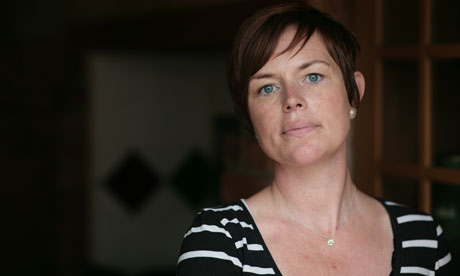
Emma Johnston was overjoyed to find herself pregnant for the first time at 37 years old, after four years of trying. She and husband Nick had planned a natural birth at their home in Poole. "I was comfortable and relaxed throughout labour," she recalls now. "Then everything changed. The midwife couldn't find the heartbeat. Our world fell apart." Daisy was born after a transfer to hospital on 21 February 2011. There was no first cry for Emma – "just a quiet, lifeless body put on my chest."
Every day 17 babies die, either stillborn or under 28 days old, according to Sands, a charity that provides support for bereaved parents. The recent stillbirth of Gary Barlow's daughter Poppy led to an outpouring of condolences online, but many of us struggle to know how to help when a friend or relative's baby dies.
Following a post-mortem, the Johnstons discovered that a malfunctioning placenta caused their healthy daughter's death. Other common factors include infection, haemorrhage, diabetes and genetic defects. However, as Erica Stewart, support manager at Sands, explains, many parents will never know why their baby died. "For over half of all stillbirths the cause remains unexplained. We need to understand what is causing these deaths."
Despite the UK's high stillbirth rate (ranked 33rd worst out of 35 economically comparable countries by the Lancet in 2011), this remains an issue that, it seems, we are reluctant to face. "It's a taboo," says Emma. "Nobody talks about it. I hadn't even heard the word stillbirth uttered until it happened to me."
Sue Macdonald, education and research manager at the Royal College of Midwives agrees. "I let bereaved parents know that friends and family may stop talking to them or even cross the road to avoid them."
Lisa and James Thomas, of Bermondsey, south London, experienced this after the death of one of their twin boys, Alex. "I have never known such isolation," says Lisa. "People just disappeared, acted as if Alex never was, or were so insensitive as to constantly talk about pregnancy and babies."
By contrast the Johnstons describe themselves as incredibly lucky. After Daisy's birth, the hospital provided a dedicated bereavement-support midwife, and they were able to bond with her in a special suite provided by local charity Spring. Their family and friends were "the reason we coped", according to Nick. "They have been instinctive and open."
Kitty Hagenbach, psychotherapist and co-founder of Babiesknow.com, echoes the importance of a support network: "Those around can help with sensitive, individualised support for as long as it takes to come to terms with the baby's death."
In Emma's experience, the first step for friends, family and colleagues is "to be brave; make the call, send a card". If you don't know what to say, Stewart suggests honesty is best. "Saying: 'I don't know what to say,' is enough. Parents can handle that."
Preparing yourself for the ways parents might behave can help. "Some parents will cry, others will be blank, normal or even upbeat," says Macdonald. "You can't predict how they will be and it is normal for them to move in and out of grief, be forgetful and even experience physical symptoms."
Don't be afraid to speak about the death. "Ignoring it won't make grief disappear," says Hagenbach. "Some parents will repress it, which is more destructive. But don't push them if they aren't ready. Be guided by them."
Above all parents crave acknowledgement of their baby. "Use the baby's name," says Stewart. "And avoid euphemisms like 'loss'; they haven't misplaced their child." Nick Johnston found those around them kept talking about Daisy as months went by. "At Christmas my mother bought her a present and another friend sent us a bird to hang on the Christmas tree in memory of her. Their acknowledgement was vital."
Sands also advises friends and family to be willing to sit and listen. Stewart gives callers to their helpline tips on how to do this well. "Try not to jump in to fill silences or you risk saying something crass. If you need to speak, reflect what the parents are feeling."
Practical support is equally vital to grieving parents. "They may stop caring for themselves," says Macdonald. "If you can do housework or look after other children it can make a real difference." The Johnstons' friends and family went further, joining Nick six weeks after Daisy's birth to run 10km in her memory and raising £11,000 for Spring. "We raised so much because people were desperate to do something," Emma says. "Now Daisy has achieved more in her little life than many people do in a lifetime."
Outsiders often wonder about a timeframe for grief, but Hagenbach says grieving doesn't have to have an end. "You never get over the loss of a child but you can come to terms with it."
For Nick and Emma, who are now expecting their second child, those around them have played a positive part in a terrible journey. "A week after Daisy died, I was sitting in the conservatory and needed to be alone," Emma recalls. "No one came and fussed over me but I could hear their chatter. They let us grieve at our pace and never forgot we are still the friends and family members that we always were, despite an awful experience we wish we'd never had."
• Some names have been changed.
• The SANDS helpline is open to anyone affected by the death of a baby: 0207 436 5881. Or visit uk-sands.org

